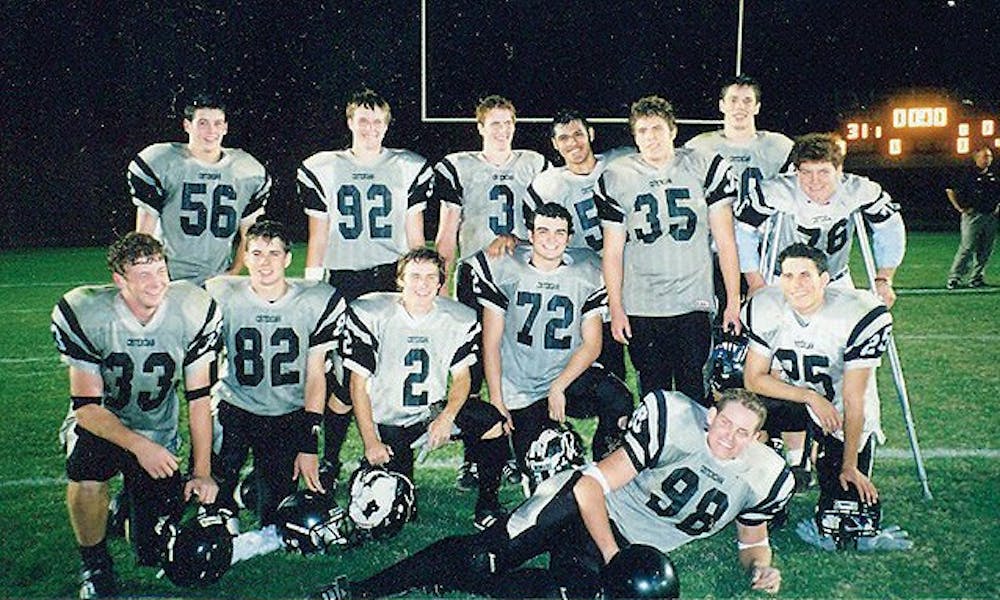Coach didn’t cancel practice on 9/11. The sun kept beating down our 15-year-old backs, whistles pierced the air and our cleats dug into the ground. It was football season in Texas, and life fumbled forward as it had to.
Still, my friends and I couldn’t wholly escape the shadow that bright September day. For the first time in our lives, we had witnessed global politics shatter our sense of normalcy and gleaned the existence of an evil that could not be rationalized away. We thought of the dead in New York, Pennsylvania, and D.C., and as we played, we did so aware that our country had just been forced to call a giant audible. We’ve been confused ever since.
In the ten years since the towers fell, fracture and collapse have become frequent themes in American life. My generation has grown up amid two wars, a dozen crumbling Middle East regimes and the loss of thousands of American soldiers. It has seen the U.S. housing market dry up, banks and industries fail and job opportunities shrink. And it has been warned, time and again, of its own cataclysmic future—one which pundits are sure will include cultural or fiscal bankruptcy, and perhaps both.
With perpetually bad news offered to us, it is a wonder that people my age don’t all dress in black. When confronted with the pessimism surrounding public affairs, what we do instead is change the channel and turn up our iPods. This should come as no surprise. When our inheritance is presumed to be so unambiguously bleak, when decades of federal policies have displaced local decision-making in which we no longer take part, and when conversations about our nation’s future are waged in terms and by personalities we scarcely recognize, is it any wonder that many 25-year-olds would rather watch a game, chug a beer or buy some shoes?
My generation has been called lazy and self-indulgent, and these traits explain, in part, its resistance toward outward displays of what Tocqueville called “those great and powerful public emotions” in American life. But another important reason for what older generations mistake for political indifference is less frequently mentioned.

Sometimes we don’t get the message because the messenger forgot it himself.
That messenger has been, at times, the news media, and at others, those educators whose professional obligation it is to cultivate young minds. Throughout our upbringing, journalists and faculty at the colleges and universities where our parents left us to “grow up” have manufactured cynicism and pawned it off on us. When we were in class, we were told to criticize American history, laws, companies and institutions, and when we got home, the 24-hour news cycle bombarded us with stories of scandal, perversion and broken promises.
Deep down, we just didn’t really get the stories we were told, so we brushed them aside. The class conflict and deconstructionism presented by faculty didn’t jive with the subtle lessons we had learned from our families, our high schools and our friends. The views offered by angry pundits didn’t make sense when we considered the democratic heroism transpiring around us—seen in the sullied faces of the first responders on 9/11, the aerial gymnastics of that pilot Sully and the high-fives and hand-shakes shared by strangers at tailgates and barbecues we attended. It was like the song being played for us was Elliot Smith, but we kept hearing Toby Keith.
Sure, modern America had its problems, but, in general, it just wasn’t a sad and broken place. We refused to be told otherwise. It was the land where, as Tom Wolfe said, “The average electrician, air-conditioning mechanic or burglar-alarm repairman lived a life that would have made the Sun King blink.”
Which brings us to the 10th anniversary of 9/11. The patriotic catharsis that day wrought still lingers, will always linger, in us 25-year olds for whom the national tragedy foretold other, smaller crises that we have, still have, to overcome.
We would, then, politely ask our educated elders to pause for a moment, to take a look around. We would humbly request that they stop talking about or around us and start talking to us, with us, in confident and energetic terms regarding those public challenges we face. And, finally, we beseech them to think back to a day not so long ago, when a Texan stood atop the rubble in New York City and, with megaphone in hand and flags waving, reminded a grieving nation that it was still a winning team.
F. Cartwright Weiland graduated from Duke University in 2008. September 12, he will began his third year at Harvard Law.
Get The Chronicle straight to your inbox
Signup for our weekly newsletter. Cancel at any time.

